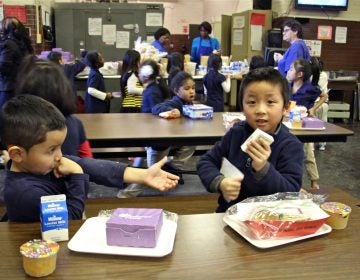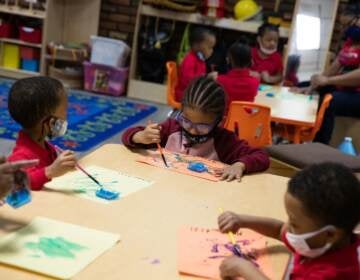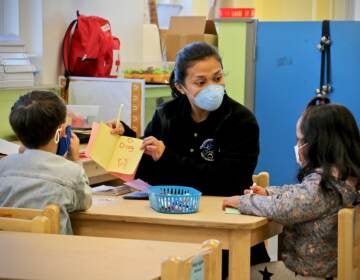Philadelphia pre-Ks could see millions in federal dollars. Parents and providers weigh in on how to spend it.
With three federal relief bills signed and a White House proposal to provide free preschool for 3- and 4-year olds, the child care sector will see a significant boost.

Close-up of a young child opening the clasp of a folder case. With three federal relief bills signed and a White House proposal to provide free preschool for 3- and 4-year olds, the early childhood sector will see a significant boost, and that money could prove transformative. (Bill Hangley/Chalkbeat Philadelphia)
This article originally appeared on Chalkbeat Philadelphia.
—
Child care providers have long struggled to stay afloat, amid narrow margins and a lack of teachers who are willing to work for low pay. Now early childhood advocates are hoping that an influx of funding could stabilize an industry hard hit during the pandemic, when many families pulled their children from community day cares.
With three federal relief bills signed and a White House proposal to provide free preschool for 3- and 4-year olds, the sector will see a significant boost, and that money could prove transformative.
“This is more than we’ve ever gotten,” said Mai Miksic, director of early childhood education policy for Public Citizens for Children and Youth, or PCCY. The funding, Miksic said, can help child care workers and allows the community “to think creatively about how to improve the child care system.” Advocates such as Miksic, along with parents and providers, are developing proposals for how the money should be spent.
Philadelphia has so far received about $86.8 million in federal coronavirus relief earmarked for licensed child care providers. The state got $1.2 billion more for child care as part of the most recent federal stimulus package, or the American Rescue Plan, and is tasked with determining how and where that money should go. Additionally, the School District of Philadelphia received $1.3 billion in COVID-19 relief, and some of that will be used for the district’s early childhood programming, officials said.
Biden’s latest proposal, outlined in the American Families Plan, unveiled during the president’s April 28 address to Congress, could shift the landscape even further. The White House says the proposal will benefit 5 million children and could save families thousands a year.
That federal plan reflects the same priorities the city “has been implementing through Philadelphia’s free PHLpreK program,” Heather Keafer, a spokesperson for the city’s Office of Children and Families, said in a statement. The PHLpreK program, launched in 2017, funds five and a half hours of free prekindergarten for 3- and 4-year olds, mostly through a tax on sugary beverages. To grow that program, “federal investment is critical,” Keafer said.
State officials have so far allocated funding that helped providers purchase materials to prevent the spread of COVID-19, and to mitigate losses suffered because of declines in enrollment and staffing, said Tracey Campanini, deputy secretary of the state Office of Child Development and Early Learning. Providers could use the funds for expenses, including rent, mortgage payments, insurance, and health care.
In making decisions about forthcoming American Rescue Plan funding, officials “want to be thoughtful not knowing how long the impact of COVID will last,” and consider immediate versus long-term needs over the three-year period that the funds can be used, Campanini said.
Even before the pandemic, the city’s early childhood education infrastrastructure was “rife for improvement,” said Jen DeBell, executive director of the Pennsylvania Association for the Education of Young Children. The coronavirus crisis exacerbated the system’s weaknesses, with some centers forced to close permanently, DeBell said.
Carol Austin, executive director of First Up, formerly the Delaware Valley Association for the Education of Young Children, said the infusion of federal funding could mean big and positive changes for the industry. Austin is calling for more investment in teacher and child care worker training.
For her part, Latonta Goldboldt, owner of Small Wonders Family Child Care Home in Logan, wants to see the money used to revise government reimbursement formulas for subsidized care, which she said always come up short. Goldboldt spends much of her time hunting for grants to balance the budget, she said.
That’s because it’s costlier to provide care than one might think, said Carol Wong, the executive director of the Chinatown Learning Center, which received about $49,000 in the early rounds of federal funding — using it mostly for payroll, health insurance, and rent.
People think that’s a lot of money, Wong said, “but they have no idea about [the cost of] payroll and health insurances, and rent. They think we’re good, but we’re not.”
For her part, Wong would like to see funding support salary increases for center staff.
The median salary of a child care worker in Pennsylvania is $10.69 an hour, according to the Early Childhood Workforce Index. About 93% are women; 45% are Black, Asian American or Latino; and people of color own 50% of the centers, according to the U.S. Bureau of Labor Statistics.
Retaining certified teachers is difficult because providers can’t afford to pay them a living wage, Wong said.
Rebecca Bohey, director of Kinder Academy in Northeast Philadelphia, faces a similar issue, often losing certified teachers to school districts that pay more. “We shouldn’t be underpaying our educators,” Bohey said, noting that she knows her staffers could earn more money at a big box store.
Wong and Bohey shared their concerns Friday during a brainstorming session hosted by First Up and Start Strong PA, a coalition of advocacy organizations. The Zoom meeting was one of four scheduled for providers, parents, and others to share suggestions about how government funding should be spent.
Evelyn Stevens and Megan Cerebe argued for increased support for parents. Families often struggle with copays if they qualify for subsidized care, rising costs or loss of subsidized care when they obtain a higher-paying job, and difficulty paying child care costs when they don’t qualify.
Stevens and her husband, whose family income is too high to qualify for subsidized care, delayed having a second child because they couldn’t afford to have two children in child care at the same time.
Cerebe suggested that copays be reduced or eliminated.
“I’m a mother of three and a deli clerk, she said. “It’s a struggle in every way.”

Get daily updates from WHYY News!
WHYY is your source for fact-based, in-depth journalism and information. As a nonprofit organization, we rely on financial support from readers like you. Please give today.





